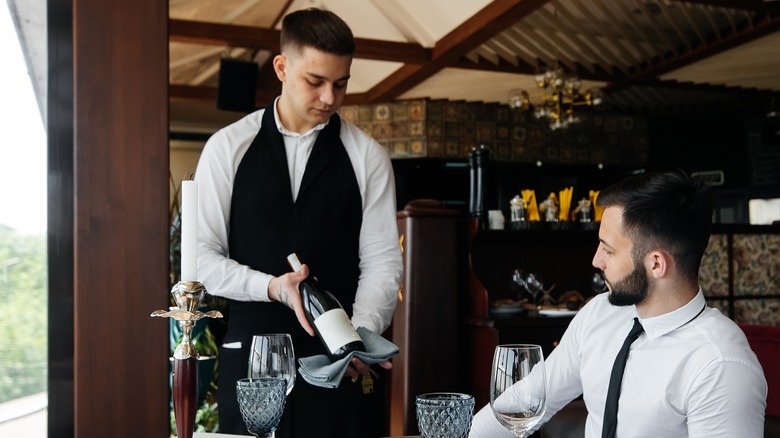The First Step To Take If You Don't Know Which Wine To Order
There is a scene in Wes Anderson's "The Grand Budapest Hotel" where F. Murray Abraham orders dinner for himself and Jude Law. With utter confidence, Abraham's character singlehandedly orders the entire multi-course meal, the pairing wine, and starting champagne without once stopping to seek an alternate opinion. It's a scene that plays into the grand notion of long-lost sophistication and elegance the film sought to portray. However, it is a notion that hardly touches upon reality, as many of us will look at a wine menu without the slightest clue of what to order.
It is perfectly fine to not know what wine to order with dinner. As Decanter points out, modern wine lists are more akin to thousand-page tomes than to actual menus. In some cases, the wine list is even longer than the food menu. So, unless you've done some thorough planning and know exactly what you're going to order, you're more than likely going to be completely lost. Fear not, for there is a simple remedy that demystifies this process.
According to Insider, if a dining establishment has an extensive wine list and a certified sommelier on duty, that person can come to the aid of baffled customers. Therefore, one of the biggest things you can do to make your wine ordering experience enjoyable is to develop a good rapport with the resident wine expert.
Ask for guidance
According to MasterClass, a restaurant's extensive wine list is evidence of a resident wine expert. If you're lost, the first place to go for guidance is the sommelier. As they likely compiled the wine list, it is a sommelier's solemn duty is to help you pick the right wine and make your dining experience as pleasant as possible.
One of the keys to getting as much help from the sommelier as you can is to develop good communication. According to Decanter, this relationship begins with you giving the sommelier as much information as possible about your wine preferences. Explain what you (and your date if applicable) like and don't like — e.g., red, white, rosé, or sparkling — as well as what you're thinking of ordering for food. This will provide the sommelier with a good foundation of knowledge from which to work.
Another important piece of information to share is your budget. As maître d' Michael Cecchi-Azzolina explained to Tasting Table, specifying your price range will help the sommelier decide which bottle will best fit your budget without sacrificing quality. It is not uncommon to see wines listed anywhere from $80 to $120 at a fine dining establishment. Understanding these price points will also help determine your overall budget.
If you're still unsure about asking for guidance, consider this. Would you rather swallow your pride and be guaranteed a great bottle of wine for your money, or feign knowledge and hope for the best?

